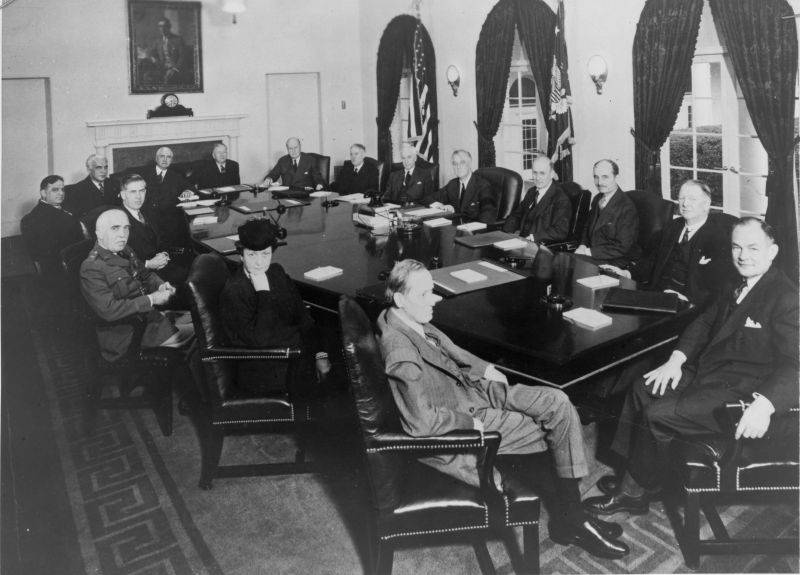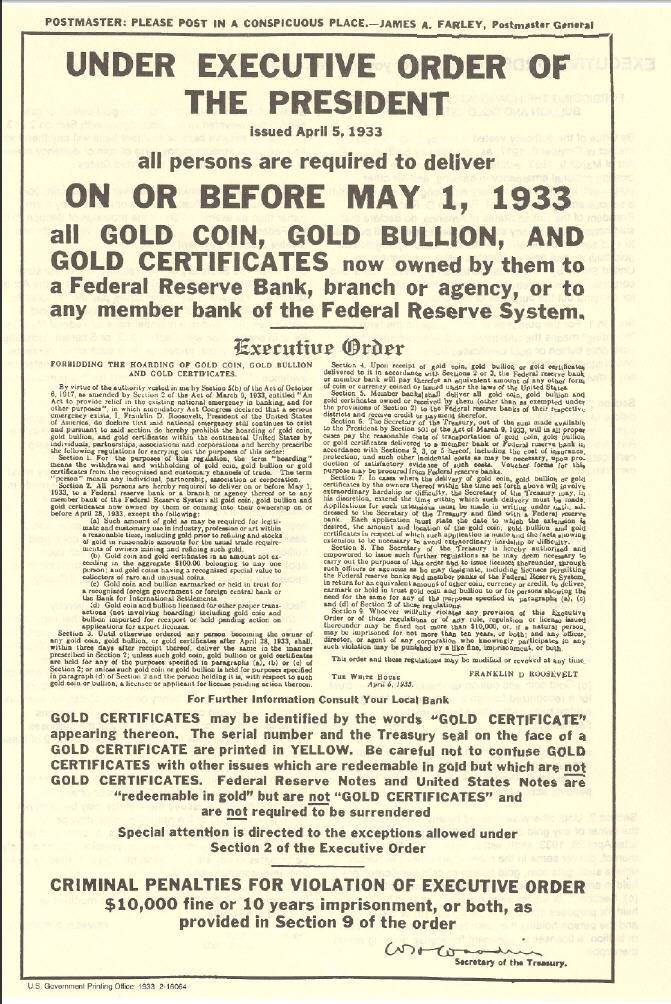Great Depression and World War II

One of the first War Cabinet meetings with US President Franklin Roosevelt after America's entry into the war in December 1941
The Great Depression
The First World War smoothed out the crisis phenomena in the capitalist system only for a short time. Already in 1929, the Great Depression began in America. The crisis also engulfed Western Europe. Severe crisis of capitalism. Overproduction, falling demand.
It seemed that the end of the world was coming in the West. When the crisis broke out, it turned out that there is no social legislation in the United States. No pensions or unemployment benefits. People were just thrown out into the street. Hundreds of thousands of people simply died of starvation and disease. In the West, they like to denigrate the USSR, in particular, to mention the so-called. famine. But in the US, the situation was no better. Goods and food were simply burned, drowned, destroyed, because people did not have money to buy them. Enraged farmers and workers, teachers and employees smashed banks and demanded to do so "as in Soviet Russia." Crowds of hungry people destroy grocery stores.
Roosevelt's predecessors, the Republicans, operated in their traditional ways. Like, the strongest survive (social Darwinism). It was similar to the Russian "shock therapy" of the 1990s, which was arranged for the country and the people by the Russian "young reformers". The Republicans endlessly balanced the budget, reduced expenditure items, and did not want to allocate funds for state programs for the development of new industries and assistance to the village. They focused on ensuring low inflation and the stability of the dollar.
No wonder the States were rocked by multi-million dollar demonstrations. The strikes were held under communist slogans. They carry portraits of Lenin, the sounds of revolutionary marches are heard. Police use firearms against strikers weapon, down to machine guns. Things come to the point that in the summer of 1932 the authorities throw troops against the veterans of the world war. Tear gas grenades and armored vehicles are used. State authorities, in order to protect their territory from the influx of homeless and unemployed people who were looking for a better place for themselves, set up police barriers and cordons at the borders. Concentration camps are being set up in sunny California.
In the spring of 1932, a banking collapse occurs. Thousands of financial and credit organizations are crumbling. Naturally, the big “whales” that absorb small and medium-sized banks win. Many Americans are left without savings. Farmers whose farms are threatened to be sold for debt take up arms and disrupt auctions. In the once well-fed America, a war between town and country is brewing, as during the Civil War in Russia. There are real battles between employers and workers. Big business crushes workers with the help of the mafia. The ghost of a second civil war hovers over the United States.
In Western Europe, in the wake of the crisis, authoritarian, militaristic regimes are coming to power everywhere. There is a collapse of democracy in its usual form. Right-wing, far-right parties and organizations triumph. Fascist regime in Italy. In 1933–1934 Chancellor Dollfuss establishes a fascist (corporate) regime in Austria. T. n. Austrofascism, which lasted until the Anschluss of 1938. Authoritarian regimes flourish in Poland and Bulgaria, the military dictatorship of Horthy and Gömbös in Hungary. Military regimes have been established in Finland, the Baltic countries and Romania. Their dictatorships were strengthened in Portugal and Spain. Nazism triumphs in Germany. The right is almost taking over in France.
"New Deal"
In 1932, Franklin Delano Roosevelt, the Democratic president, came to power in the United States. He proclaims and implements the "New Deal" (English new deal) and refuses the principle of non-intervention of the state in the economy. Banks are closed for a while - the Reconstruction Financial Corporation opens. An emergency law is introduced that guarantees private deposits in surviving banks. But people face criminal penalties if they keep money in a "mattress". Americans were forced to deposit money in banks again.
On April 5, 1933, Roosevelt signed Decree No. 6102 on the actual confiscation from the population and organizations of gold in bullion and coins. Individuals and legal entities (including foreign citizens and companies that stored gold in the United States) were required until May 1, 1933 to exchange gold for paper money at a price of $ 20,66 per troy ounce in any bank in the United States. For evading the delivery of gold, a large fine of up to 10 thousand dollars or a prison sentence of up to 10 years was set. The US is establishing a gold reserve at Federal Reserve Fort Knox, which was completed by the end of 1936. After the end of the gold collection, its official price was sharply raised to $35 per ounce.
A powerful sector of state industry is being formed. Production planning and state control over prices are being introduced. Treasury money is used to finance industrial projects. Serious assistance is provided to the agricultural sector. Huge funds go to public works and the development of the military-industrial complex, in particular, to shipbuilding. The Civil Engineering Corps (an analogue of the Soviet labor army) was created, where hundreds of thousands of previously unemployed build highways and dams. For just a dollar a day and food. Mechanisms for the social protection of ordinary Americans are being introduced. Businesses are required to introduce a minimum wage.
The President was given the right to issue decrees instead of laws. State rights are being cut. Intelligence agencies are being strengthened, in particular, the Federal Bureau of Investigation. The FBI is crushing the criminal revolution that began during the Great Depression. Stops the link between organized crime and business and officials that has begun.
It is not surprising that some politicians and big business opposed the president. He was called a dictator and a communist. In turn, Roosevelt throws lightning at the oligarchs, monopolists, "new feudal lords" and "kings" of big business, who almost brought America to collapse with their activities.

Decree No. 6102 on the actual confiscation of gold from the population and organizations
Vector to the big war
However, despite some successes (the development of production, the military-industrial complex, energy and transport infrastructure, the creation of the country's gold reserves, etc.), the New Deal clearly cannot pull the United States out of the pit of a severe crisis. In 1937, a new wave of crisis rolls. Unemployment is rising rapidly again, production is falling. The economy is in a fever, despite all the efforts of the Roosevelt team and fundamental reforms. Analysts are talking about a new depression and economic collapse in the early 40s.
It's about the capitalist system itself. Roosevelt could not overcome it without a radical restructuring of the entire system, following the model of the USSR, where there was no crisis during this period. On the contrary, the USSR developed rapidly. There was only one way out - again a world war, which would allow contradictions to be dumped on other countries, lead to an influx of gold, capital, and cheap labor. It will allow you to rob other powers, such as China, Japan, the USSR, Europe, and penetrate the markets of decrepit colonial empires, in particular, the British Empire.
A new global carnage has become Washington's only hope. It allowed not only to overcome the internal crisis, but to emerge from the war as a world hegemon with no competitors. Therefore, Washington is doing its best to prevent the creation of a collective security system in Europe that could prevent the outbreak of a major war. Roosevelt supports the policy of Chamberlain, who "appeases" Hitler at the expense of his neighbors and pushes him to the East. Anglo-American banks finance the militarization of the Third Reich. Moreover, the United States did not break economic ties with Germany already during the Second World War.
Actually, Roosevelt's "New Deal" was the preparation of the United States for a big war. This is the mobilization of the United States, which began earlier than in Nazi Germany. The budget has been improved. Production costs were reduced, cheap labor was obtained (the Great Depression lowered the cost of labor to zero, people worked for food), the monopoly capitalists were reined in. From 1934 to 1938, the US military budget doubled.
America is preparing for war with might and main, while Europe has not yet thought about it. In essence, labor armies have been formed to modernize the country's infrastructure. Large state-owned enterprises are being created. Aviation and shipbuilding industries were nationalized. Everything went under the slogan of protecting ordinary Americans and creating jobs for them. In the end, a semi-planned mobilization economy was created, which surpassed the German and Soviet ones. America was richer than all countries, had the most powerful industry.
Thus, the United States carried out colossal militarization before anyone else in the Western world. Only the Stalinist USSR was before. In Moscow, they perfectly understood where the world was heading. In the United States, a mountain of weapons was riveted by the beginning of World War II, aircraft and ships. The problem was that it was impossible to produce mountains of weapons for a long time with impunity for the economy. The weapon must be used. Without a world war, the United States would have fallen into a new wave of severe depression, possibly into a civil war.
Roosevelt printed dollars in the 30s, prepared the country for war and riveted mountains of weapons. Therefore, the world war in 1939 in Europe (and in China even earlier) began just in time. First-class aviation and a huge fleet immediately became in demand. The United States came to the war the most prepared.
In addition, the war was on foreign territory. Washington used German and Japanese "cannon fodder" to start a world war.
Japan and Germany were officially the aggressors. And the USA is a stronghold of democracy, freedom and goodness. Very comfortably. Other countries, in order to receive financial, material and military support from the United States, became dependent.
Information